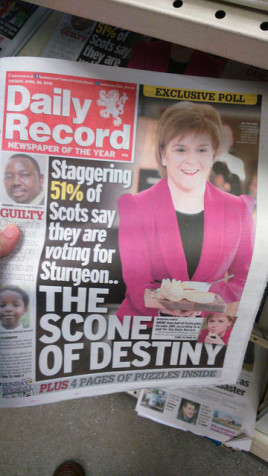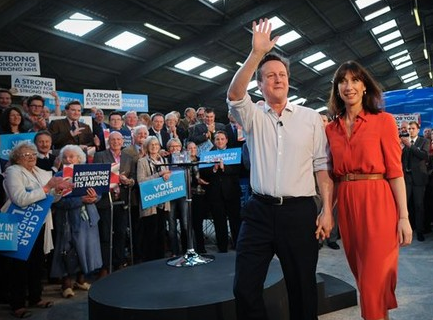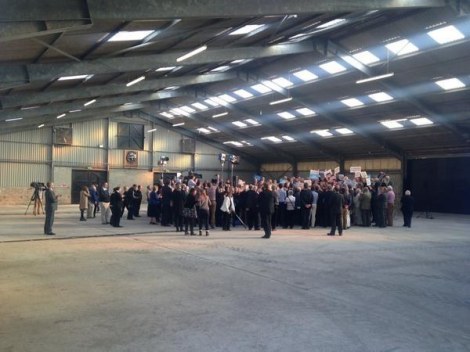This post by Professor Rod Stoneman, Director of the Huston School of Film and Digital Media at NUI Galway, and a member of the Pod Academy advisory board, first appeared on The Column website.
Eye-catching storylines fascinate the British media as they report daily contention in the month leading to the parliamentary election in May 2015. Entwined narratives build as new elements are added and then speedily replaced by fresher and more attention-grabbing headlines. It is a fleeting moment, a national vote every five years, but even this most limited version of democracy is played out in digression and distraction. Journalists and commentators are uninhibited as they reiterate cliché and depend upon patterns of repetition. Overall our perception of election discourses is dominated by their tendency towards the inconsequential, which alienates sections of the population by their terminal triviality. Discord and acrimony circulates without substance.
Political difference is constantly simplified and psychologised. On 9th April Miliband was attacked with a sound bite by Michael Fallon, Defence Secretary: “He stabbed his own brother in the back, now he will stab the United Kingdom in the back to become Prime Minister.” It is astonishing that a male version of sibling rivalry, the ancient myth of Cain and Abel, should loom behind a debate on defence and the nuclear deterrent. The system is circular – the original utterance is designed and released for the press to take it up. The speed and rhythm of the traditional media, newspapers and news bulletins, is increased by the advent of ancillary electronic media and 24 hour news. The media’s instinct for the dramatic reproduces the statement without delay, then Gloria De Piero, Labour’s Shadow Minister for Women, rebuffs it: “Tory personal attacks just show how desperate they are. Fallon should be ashamed.” The whole exchange somehow sets aside or minimises any kind of a substantial discussion of nuclear weaponry in the wider body politic.
Privately owned commercial media utilise every opportunity to intervene directly in the service of their underlying political motives and manipulations, the right wing press is brazen in putting out misinformation. An article in Open Democracy by Adam Ramsay on 6th April focused on the establishment’s perceived danger of a SNP coalition: ‘The newspapers are preparing for a coup, and Labour is doing nothing to stop them.’ Public service media are in cautious mode as they are under fierce scrutiny themselves; all parties have their stop watches out to check the timing and ‘balance’ of coverage. There is trepidation in relation to the television debates as they are intense media moments and it is very easy to mis-judge a formula or wrong-foot a formulation leaving the broadcaster vulnerable. Few enquire how the television debate format frames the terms of the contest and how the images and discourses of election coverage relate to policy implementation or operation.
Manichean filters, the good versus the bad, work through visual appearances and carry the underlying arguments. Everything is focused on the personal and then displaced onto the irrelevant – the slightest slip while eating a bacon sandwich re-enforces the perception of ineptitude and inability. It develops its own iconography – Farage familial as the nationalist populist, pint in hand, the joker in the pub can be modulated to gravitas as a potentially professional politician.
The male contenders take their partners with them, they have a type of adjectival function in support of the male image. There have been entire articles about Miliband’s hypothetical girlfriends and Natalie Bennett was attacked by the Labour loyalistDaily Mirror for her partner’s ‘X-Rated’ blog posts.
The contestation is embedded in an image system. The newsfeed carries bumpy pictures of Cameron mobbed by supporters as he emerges from his election ‘battle bus’, until a tweeted picture reveals it has been staged in the corner of a mostly empty car park.
Revealed by social media the incident exemplifies the way that digital forms offer some potential for change without substantially altering the terms of traditional election coverage overall. There is a degree of self-consciousness and a relative reflexivity in the media – some commentators express their fascination with spin and the choices of tactics in campaigning, but there is general avoidance of any deeper analysis of the politics of representation.
Psychologically, personally, the noise of these minor skirmishes soon feels oppressive and isolating; one can but await the way it will be wound to fever pitch in the coming weeks. The underlying metanarrative of the competition is a cliff hanger punctuated by opinion poll graphics and maps of psephology. Narrative tension increases as small movements in the numbers jeopardise a predictable result. The general background ambient sound of British politics becomes more noticeable as political discourse and specious punditry accumulates over a concentrated period.
The unspoken gaps and missing agendas are constantly significant. The forms of expression available for electoral arguments do not welcome complication and depth. As Haitian filmmaker Raoul Peck suggested “We live in a world that does not encourage complexity.”
The customary shortfall in the media’s attention span means opportunities to extend agendas, make deeper connections and introduce analysis into the wider public domain are left aside. 50 Shades of Grey, Jimmy Savile or Rolf Harris, Dominique Strauss Kahn can be understood to be ‘about’ power and gender. Nuclear weaponry could be opened towards the initial basis for a long term exploration – the abolition of war itself. The scale of the financial depression still awaits public consideration and assessment about an economic system which is not fit for purpose. Understanding the ecological crisis and the economy of perpetual growth scarcely confronts the implications for the way we work and live. The crisis is anticipated but not acted upon – perhaps that is due to some failure of our imagination – and is also clearly indicated in the hollowing out of participation in political parties and electoral processes.
The competitive interaction of parties is centripetal as they scrabble for the middle ground – Blair was once accused to “taking moderation to extremes.” Vocabulary and phrasing acts out a self-predictable prophecy; the ‘extreme’, the ‘far’ left is always bound to be wrong. Lack of breadth in the range of debate in the media is parallel to the constraint of actual political choice in Western elections – it reinforces the absence of entities with agency to change the situation. There is no Syriza or Podemos in the UK (there are complex historical and cultural factors at play in Greece and Spain, Venezuela and Bolivia that allow other forms of politics to emerge from their electoral processes). Self-fulfilling prophecies and vicious circles in the political formations exclude the parties and possibilities of through going change in England. A symbolic order connects with a social order and they constantly renew and reinforce each other.
A climate change caused by the release of market forces in television have reduced the range of public service broadcasting and eliminated production and programming from small independents. Artists’ video work and experimental film has migrated from a film context to the gallery and visual arts spaces. They have found refuge, but lost a wider audience in the process. The internet offers possibilities for expression, but mainly transient and individualistic in an electronic equivalent to the Tower of Babel or Speakers’ Corner in Hyde Park. Inaccessible or unheard expressions do not constitute a dialogue; speech which is absorbed into a pervasive hubbub does not justify the West’s self-righteous proclamations of openness and democracy.
Television is locked away from vital political and artistic interactions. It is limiting that the main challenges to dominant British media are other state funded controlled channels with their own narrow national and regional agendas: the English version ofAl Jazeera, Telesur led by Venezuela, Russia Today…
However sometimes making use of the uneven opportunities of social media demonstrates the potential to break out of the dominant media. The enormous popularity of Russell Brand’s Youtube videos indicates a thirst for alternatives. There are some precious web resources: Open Democracy, Pod Academy,Libcom and Novara Media. Small incisions that challenge ossified media forms through new means. Perhaps these are starting points to develop the full spectrum contention that is necessary to create a climate for new agendas.
“At the very moment where all is lost, everything is possible.”
Emmanuel Lévinas.
Tags: Bennett, Cameron, Clegg, Election coverage, Farage, Media studies, Milliband, UK election 2015




Subscribe with…